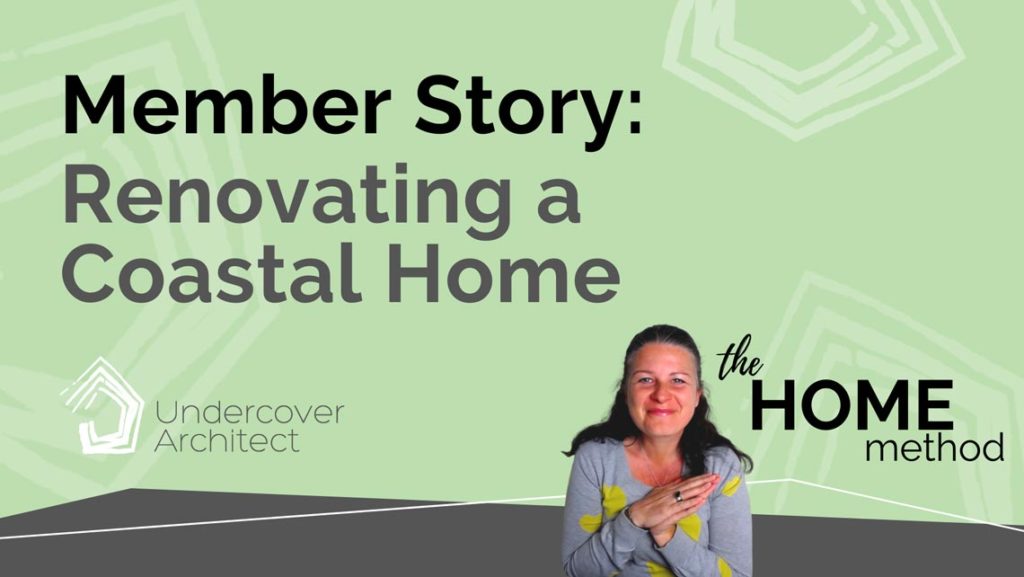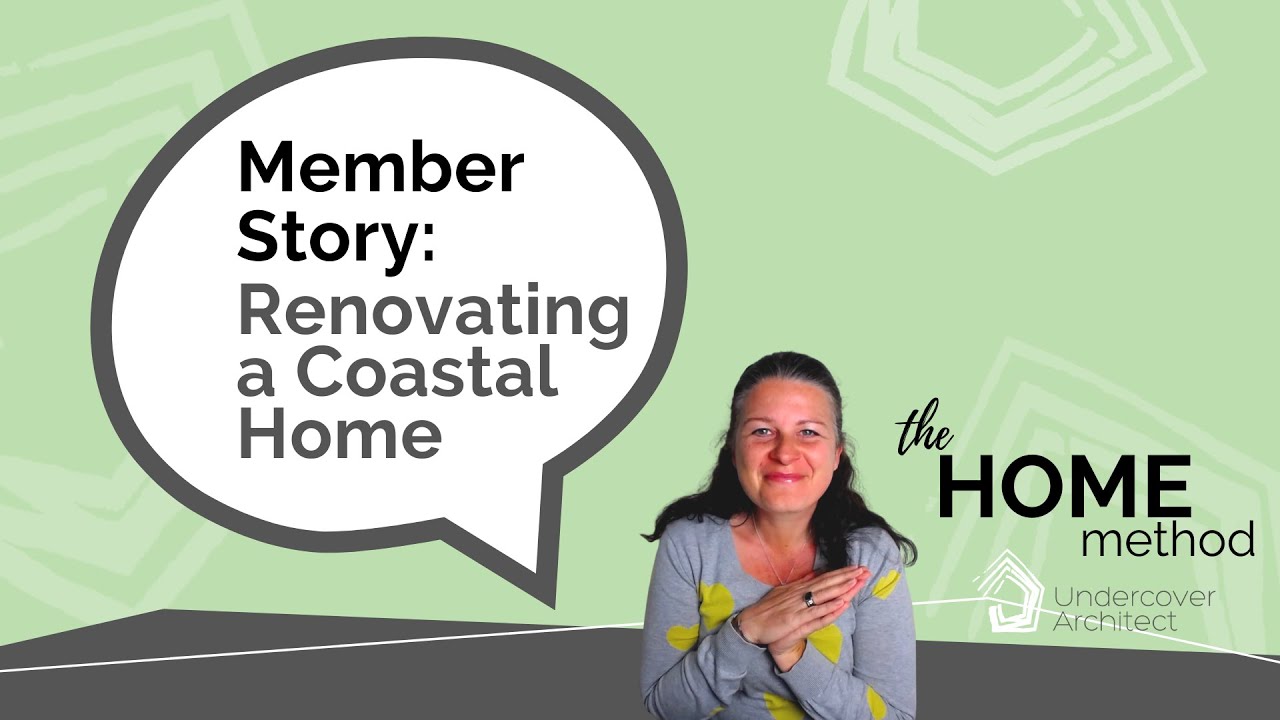
Linda was renovating a coastal home. With leaks and other issues, she wanted to ensure she could get it right.
Listen as Linda shares more about her renovating and repairing journey, how she was able to work better with her builder, and the help she’s been able to access through her membership in Undercover Architect’s online courses.
My name is Linda. I live in Kiama, New South Wales in Australia, which is a small coastal town, about two hours south of Sydney. I undertook some home renovations last year.
Tell us a bit about your project
So I live in a relatively new house, so it was only five years old. But it had a significant issue with leaking from the upstairs, down into the main bit of the house. And because I live so close to the coast, it’s quite windy, the weather is quite wild. And when it rains, it rains quite heavily. So this was a really big problem.
So the renovation was about covering in the balcony to extend it to be part of the house. And because of the problems that I’d had with the leaking, I wanted to make sure it was absolutely watertight, and gale proof and all those sorts of things, because the weather is pretty wild, right here. But at the worst of it, I’d say look, I got 100mm outside and 40 litres inside. You know, just to help explain the context.
What concerns did you have before you started?
So I had – you can appreciate because of my experience, I had thought I’d bought a new house, and therefore it would be solid. And you know, I wouldn’t have to worry about major repairs or even a renovation to be fair. And that whole experience made me incredibly nervous, because the builder that originally built the house denied any responsibility for the leak. And I had to go through Fair Trading, and I just felt I snookered every time.
And I just didn’t have confidence in many of the tradespeople or in myself, to ensure that that same thing didn’t happen again. That I’d get snowballed or, you know, somebody would … I just felt it’s stuff I don’t know enough about to feel confident.
And given the significant asset that a home is, you want to make sure you you know what you’re entering into, because if it comes unstuck, you’re unstuck in a very big way. Not just in terms of having insecure housing, but then you know, your finances, everything is tied up.
So I just needed that – I needed to feel more confident and knowledgeable about what I was entering into, because I’d had a series of unfortunate experiences leading up to that. So I wanted to start afresh.
Getting over that psychological barrier of being able to trust, again, because of what had happened, it’s it started with, well #1, I had to find a builder that I felt comfortable with. And I went through quite a process.
I must have interviewed about 20 or so different builders. And that was partly to do with once they heard that I’d had problems with the house originally, they were anxious about also being held liable. So people weren’t interested in that.
But also because the area where I live, there’s a lot, like it’s, there’s a lot of building going on. So builders were in high demand, so, it was really hard to find a good builder that was able to do the job because most of them had waiting lists for years.
Then came the contract negotiations. And I had some legal advice. And there are a couple of clauses where my solicitor was saying you really need to negotiate on this or that. And the builder was actually coming back saying “no, that’s unreasonable”, etc. But they were really basic causes like Liquidated Damages.
So there were a few things like that. And I thought, ‘Ah, here we go’. Anyway, so I was in a tizz about it. Because the builder and the architect were both sort of saying ‘you’re being unreasonable, you know, this is pretty common practice’ and all that sort of stuff.
And I, in my gut, I just, it didn’t feel right. And the solicitor was saying, “please don’t sign unless those particular clauses are in there”. And I just thought, I don’t know who to trust because my trust has been breached before.
How did you first find Undercover Architect?
Anyway, I just was googling and I thought, how do you learn or how do you find out what’s a reasonable thing without paying hundreds of dollars an hour from another solicitor to find out.
Anyway, I just googled and found this Undercover Architect and I thought, “Oh, this sounds perfect”. And I listened to one of the free webinars. So I participated in one of those.
And I just liked Amelia’s no nonsense style. And she actually spoke to things that actually were real for me. Like she clearly knew what she was talking about. Or she understood the whole process and understood how you as a client can feel. So I think sometimes, when you hear other professionals talk about the building process, they’re talking about it from their perspective.
But the way Amelia spoke, I thought she really understands. And I don’t feel so silly in being anxious about this contract issue, for example.
What made you decide to join Undercover Architect’s course?
And she gave that confidence and then I ultimately signed up for the Manage Your Build course (which is inside the HOME Method). And then I must have watched everything within about three or four days, like I just because I was in such a tizz, I just thought ‘Linda, you’ve got to get on top of this, you’ve got to get, you’ve got to feel confident’.
And I’ve believe I’ve got a brain in my head. And I felt like I needed to use it. And I just didn’t want to be snowed, I suppose, by somebody telling me you don’t know what you’re talking about little girl, forget about it.
What did you enjoy most about the Undercover Architect course?
So anyway, it was really good to hear both Amelia and Duayne, the builder fellow that features and she also had a solicitor. And they just went through all the very things that I had not been sure about, or were struggling with, and spoke about them in a plain English way that I understood.
And I thought, ‘Okay, this is normal, it’s normal for there to be a little bit of tension about these things, you’re quite within your rights to ask for more clarity’.
And she had just really practical tips on, you know, even like templates for how to keep notes of the meetings that you have with the builder and with the architect, and what have you, to make sure there’s no room for misunderstanding.
Because I’d been made to feel, you know, I was being a bit neurotic, or, you know, overly anxious, but the way she spoke, it made me realise what I was talking about was quite reasonable.
What were the benefits of the Undercover Architect course?
So that was the benefit of the course. And I did, it gave me the confidence to hold my ground.
And originally, when I gave the feedback back to the builder, and the the builder, and a little, to a lesser degree, the architect, I just said, ‘Actually, I’m going to walk away, like if you’re not going to agree to liquidated damages, and to a reasonable interest rate and all those sorts of things. Let’s hope we never have to utilise those clauses. But it’s important to me that they’re there’.
And so I walked away, and I said, ‘Look, I’m happy to find someone else. You know, I don’t have to do this. There’s there’s no urgency in it. I said, I can sit here with my buckets for as long as I don’t want to go ahead with something that I’m not confident of’.
So we both went our ways for a couple of weeks.
And then the builder actually got back to me. And he said, ‘Look, I’ve been thinking that I’ve been a bit pig-headed in a way, on principle, and what you’re saying is quite reasonable, and let’s do business’.
And, and in the end we did and it was a terrific build, I’ve got no hesitation recommending him. He did a wonderful job. I can’t tell you how much doing that Manage Your Build course just took my stress levels right down.
And I just thought, okay, I can do this. I felt confident to negotiate. So it was great.
What have you done differently because of the Undercover Architect course?
And I think then the other thing was once the build was underway, well actually, just before the build commenced, I’d done that course. And then I realised there were things like the specifications around the windows and the insulation and stuff like that, that I hadn’t paid so much attention to I hadn’t realised the significance of those things.
But having done the course, I thought, oh, gee, I better triple check this.
And anyway, I did end up upgrading the windows and the insulation. And again, the initial thing was, Why do you need that? And I said, Well, you know, we get 120 kilometre an hour winds up here on a regular basis. And when it does rain, it’s hundreds of millilitres at a time. It’s not vertical, right? Like it’s, it’s wind and rain.
And I said, so if I’m going to spend all this money, I just want to make sure I’ve got the right insulation and the right, the type of thing.
And my house is also in a bushfire zone. So there’s certain glass that you need to have in that situation. So again, I, you know, listened very closely to the course around those sorts of things.
And in fact, I participated in a live Facebook session with Amelia and asked questions in that around the windows and the outdoor covering the Colorbond (we have regular Q & A sessions for members inside HOME Method). Because again, because I’m so close to the sea, there’s only there’s certain sort of Colorbond that you have to use that doesn’t wear as quickly as the normal.
So it was just those sorts of things that I would never have probably thought about, I wouldn’t have even known that you had to think about them. And no one drew them to my attention, until I did the course, are, yes, that’s, I need to focus on that. And, and I’ve got a good result. As I said, really thrilled.
Was it worthwhile doing the Undercover Architect course?
It was worth every penny, and every hour I spent on those webinars. Saving my sanity was a major benefit. Yeah, I think I just once I got over that hump, it just made it the whole thing doable.
And, you know, I had a constructive relationship with the builder and with the architect, as a consequence.
And I just felt confident, so it just saved – the fact that my anxiety levels dropped so much meant you could just get on with it and make it happen. And it did, it went like a dream.
And it’s still going strong. And you know, we had pretty wild winds last night, and the house is still here. So that’s all good.
What would you say to others thinking of joining an Undercover Architect course?
I just think you’ve got a responsibility to yourself.
If you’re going to invest so much, you know, like your house is usually your biggest asset, in financial terms, you owe it to yourself to be confident and knowledgeable about what it is exactly you’re entering into. Because it’s going, more often than not, it has a lifelong impact.
You know, even if you choose to sell, you know, some other poor sucker may inherit a problem.
And having been the recipient of some poor quality building, you don’t want to wish that on anybody else. So, you know, I suppose it’s just do yourself a favour, feel confident, and then you can actually enjoy the process.
It doesn’t have to be as stressful as what it might be otherwise, and there is no barrier to you understanding what’s going on. You don’t have to be blinded by building talk or architect talk or tradie talk. You know, it is possible to talk about it in plain English, and have a sensible conversation and get the outcome that you want.
So yeah, I just, I just think the money is minor, compared to how much you could easily waste just choosing the wrong thing.
I have been recommending the course to friends, anybody that is about to embark on this whole thing because I’ve come to learn that my experience is not unusual and that lots of people worry about it, but they seem to just focus on reading, you know, Home Beautiful magazines or whatever and get their their wisdom from there.
And it’s the detail that you really need to understand. It’s not the look so much, it’s the fine print and the legalities and just the technical specifications. It’s really hard to get that information from a neutral party.
Having it broken down in the way that Amelia does, in a plain English way that an everyday person can understand … it was just, Oh, I can’t tell you how that helped me to just take a deep breath and have the confidence to progress.

 With over 30 years industry experience, Amelia Lee founded Undercover Architect in 2014 as an award-winning online resource to help and teach you how to get it right when designing, building or renovating your home. You are the key to unlocking what’s possible for your home. Undercover Architect is your secret ally
With over 30 years industry experience, Amelia Lee founded Undercover Architect in 2014 as an award-winning online resource to help and teach you how to get it right when designing, building or renovating your home. You are the key to unlocking what’s possible for your home. Undercover Architect is your secret ally
Leave a Reply